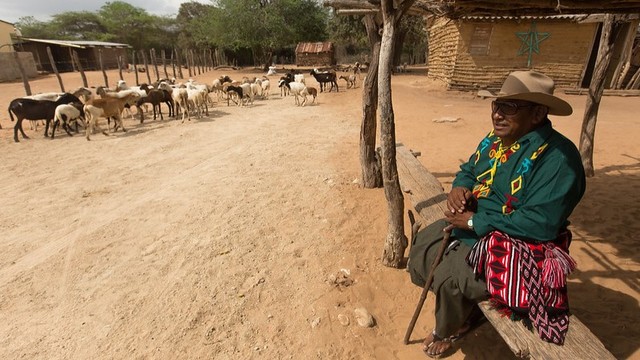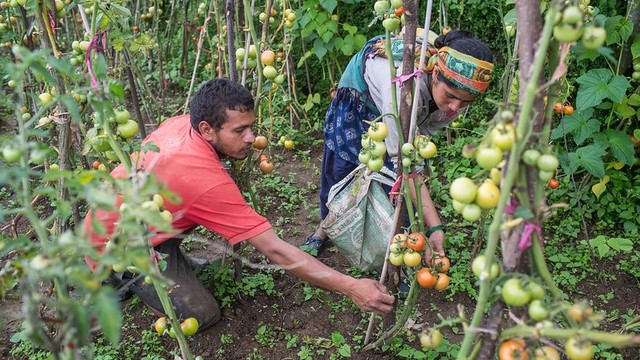The push for clean energy: how nickel mining expansion is impacting agrarian economies in Indonesia
Indonesia’s nickel mining sector is set for massive expansion to feed global demand for batteries for electric vehicles. But what impact does this transition have on traditionally forest and farm-based economies in North Konawe regency, Southeast Sulawesi province.


Rice thrashing in Java Tengah, Indonesia. Farms producing crops such as rice are being impacted by the global need for nickel (Photo: Danila Maltsev, via Flickr, CC BY-NC-ND 2.0)
Across the 5000km² of North Konawe, agriculture, forestry and fisheries sectors are the economy’s largest contributors.
All these sectors are interconnected: local communities practice a form of shifting cultivation, producing field rice and maize among other crops. This system depends on the rich soils produced by the forests.
This blog draws on the experiences of people in five villages across three North Konawe subdistricts: Wiwirano, Landawe, and Langgikima, together covering over a third of the regency.
Ninety-four per cent of land across these three subdistricts is designated ‘forest land’, with the remainder being ‘non-forest land’. Here, over 11,000 people depend on farming to meet their livelihood needs.
But this forest area is coming under mounting pressure. Over the last three decades, large tracts of Indonesia’s forests have been given over to oil palm plantations; Indonesia has become the world’s largest palm oil producer. North Konawe has been transformed by this expansion.
Now, the expansion of nickel mining, heavily promoted across the regency since 2007, leaves these already vulnerable forests facing even greater threat.
Losing land and labour to mining – farming land, forestry, coastal areas under mining concessions
Across the three subdistricts, 2,783 ha (1.4%) is already covered by active mining concessions and mining now accounts for over a fifth of North Konawe’s GRDP − although still significantly less than agriculture, forestry and fisheries, which account for well over a third (2022 figures).
In Wiwirano, Landawe and Langgikima alone there are 47 mining permits, covering 32,284 ha, or 16%, of the land.
Across the five villages, mining concessions now overlap with over a quarter of land traditionally used for farming. Added to the palm oil plantations, the expansion of mining is leaving some villages with little or no farmland at all.
This presents major challenges and huge uncertainty for local farmers. Youth are choosing to work for the mining companies as this provides them with instant cash. Loss of farm labour alongside weak tenure security is challenging the viability of forest and farm-based livelihoods.
Competing claims amid weak land governance
The pressures on land due to mining expansion are made more complex by competing and overlapping claims for the same land. Land policies are poorly formulated and boundaries are unclear.
There are also limited opportunities for communities to influence land governance: forest area management is governed by the Ministry of Forest and Environment and mining permits are issued by the Ministry of Energy and Minerals. Land titles are also handled at national level.
Research conducted by TERAS in June 2019 in the three subdistricts revealed the weak position communities find themselves in with respect to land classifications and competing claims.
Families can apply for a title deed but only on land classified as non-forest (making up 6% of land across the three sub-districts). Communities that live on forest land, including resettled communities (relocated in the past by the state from other areas of Indonesia) cannot secure a title and now find themselves within mining concessions. However, even on land secured by title, permits are issued irrespective, and titles disregarded by permit holders.
Pathways ahead?
Komunitas TERAS is working with communities to identify and navigate different pathways to securing their land rights, in particular exploring options under the government’s land reform programme.
For example:
- Families can register their land through the land reform programme’s agrarian reform scheme ‘TORA’, intended to distribute and formalise ownership of land to landless or smallholder farmers. Once land is registered with the scheme it cannot be sold for 10 years. Currently, this is only applicable to non-forest land but the government has committed to releasing substantial forest land for inclusion in TORA. In 2022 and 2023, 100 plots have been certified under the TORA scheme, totalling over 28 ha.
- ‘Social forestry’ is a scheme through which village level organisations can submit a proposal to manage a forest area in accordance with the regulations set out by the Ministry of Forest and Environment, gaining management and use rights for 35 years. One farmer group of 55 members in a village in Landawe sub-district now manages 87 ha of forest under the social forestry scheme, securing protection from mining and plantations.
- Land can also be classified as LP2B (Sustainable Food Agriculture Land) through a scheme under the Ministry of Agriculture. Once the area is registered as LP2B, it cannot be overlapped by concessions for either mining on mono-crop plantations such as palm oil. The LP2B scheme could provide the greatest form of tenure security in the face of mining concessions. But farmers are hesitant to register their land as LP2B: once they do, it cannot be changed to another land use. Most farmers want to have the option to sell their land in the future, keeping it as a form of insurance. In Landawe sub-district, a proposal for 223 ha to be included in the LP2B scheme is awaiting government approval.
TERAS is facilitating dialogues with communities on the trade-offs of different schemes, with long-term food security in mind. Support includes discussing options for partial registration of their farmland under LP2B and how to navigate registration under the TORA scheme.
TERAS is also identifying state forest land for reclassification to non-forest land to be included in the TORA scheme.
Negotiating a fairer future
TERAS is doing what it can to make use of different schemes to promote community land rights. This work supports communities keen to sustain their forest and farm-based livelihoods and secure local food production to mitigate the impacts of the transformations at play.
But the circumstances are very limiting. Options for registering land involve complex and lengthy processes that can be prohibitive, or tie farmers into restrictive long-term ownership.
Even more challenging is that titles generated have little weight in the face of mining permit allocations. In the transition to a mining economy, the future of agriculture, forest and fisheries-based livelihoods in North Konawe is uncertain – raising questions about local food security, alongside the many other impacts of plantation and mining expansion, and putting into question hopes of a just transition to a low carbon future.
If meeting global demand for nickel is to be just and sustainable, local communities, with the support of TERAS, among other organisations, and in collaboration with authorities at different levels, will need to call upon many other strategies to assert local community rights and livelihoods.
This blog emerged in the context of a scoping visit conducted as part of ALIGN, a project implemented by a consortium led by IIED, CCSI and Namati



